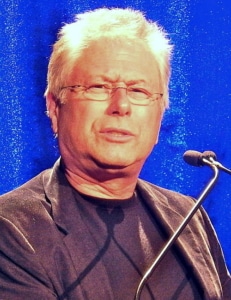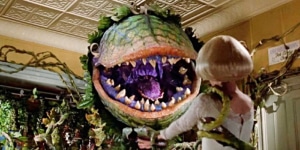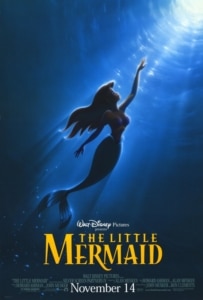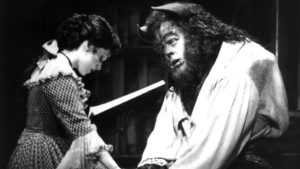DCPA NEWS CENTER
Enjoy the best stories and perspectives from the theatre world today.
Enjoy the best stories and perspectives from the theatre world today.
Alan Menken is perhaps best known for his work in musical film scoring, including but certainly not limited to The Little Mermaid, Beauty and the Beast, Aladdin, Pocahontas, The Hunchback of Notre Dame, Hercules, Newsies, and Tangled.

Alan Menken in 2013
Theatre enthusiasts might recognize Menken’s stage productions, many of which are adaptations of his work in film and have been performed on Denver Center for the Performing Arts’ stages, like Beauty and the Beast, The Little Mermaid, Newsies, and Aladdin.
To understand Menken’s accomplishments, we must look back at the beginning. All successes start somewhere.
From a young age, Menken showed musical promise. An original composition he entered into the New York Federation of Music Clubs Junior Composers Contest was considered “Excellent” by the judges. He was only nine years old.
Menken graduated with a degree in music from New York University in 1972. He then joined the Broadcast Music, Inc (BMI) Musical Theatre Workshop and was mentored by Lehman Engel – Engel was a lauded composer in the 1950s and 60s before founding the BMI Workshop.
Under Engel’s tutelage and exposure through the BMI Workshop, Menken worked as an accompanist and contributed material to several Off-Broadway productions and revues throughout the 1970s.
In 1979, Menken found his first major success with the musical adaptation of Kurt Vonnegut’s God Bless You, Mr. Rosewater, which premiered at the WPA Theatre in New York City to rave reviews before transferring Off-Broadway. Howard Ashman, a fellow student of the BMI Workshop and Artistic Director of the WPA Theater, had selected Menken to contribute music to the new production, with Ashman writing the book and lyrics and directing.
Thus began a lifelong partnership between Menken and Ashman.

Little Shop of Horrors, 1986
Their next undertaking was Little Shop of Horrors, about a hapless florist who raises a plant that feeds on human blood. The quirky, dark musical is based on the low-budget 1960 black comedy film The Little Shop of Horrors. The show premiered at the WPA Theatre in 1982 before, again, transferring Off-Broadway to the Orpheum Theatre. The new, surprising musical broke records as the highest-grossing and one of the longest-running shows in Off-Broadway history, running for five straight years.
The musical was adapted to film in 1986, with Menken and Ashman writing a new original song, “Mean Green Mother from Outer Space,” specifically for the film. As luck would have it, the new song was nominated for an Academy Award for Best Original Song at the 59th Academy Awards, making history as the first Oscar-nominated song to contain profanity in the lyrics.
After Little Shop of Horrors’ critical success and popularity, Menken and Ashman were hired by Walt Disney Studios to write the music for a new movie that would become The Little Mermaid.
Disney had been suffering under tumultuous leadership changes after the death of Walt Disney. Films weren’t performing well at the box office or receiving positive acclaim. Ultimately, the studio was highly motivated by direct competition, including the rise of overseas animation by Hayao Miyazaki at Studio Ghibli and long-time Disney animator Don Bluth’s departure to start a rival studio in the United States.

Disney needed a box office hit, and they needed it badly.
At the time, Disney’s Feature Animation President was Peter Schneider, who served as company manager for the original production of Little Shop of Horrors. When searching for the right people to make The Little Mermaid a critical and commercial success, Schneider brought in Menken and Ashman. It was the right call.
The Little Mermaid opened in 1989 to massive success, breaking records as the highest-grossing animated film, and was nominated for three Academy Awards, winning two for Best Original Song (“Under the Sea”) and Best Original Score. It marked the beginning of the “Disney Renaissance,” a golden age of Disney movies.
Menken and Ashman collaborated again on Disney’s next fairytale, Beauty and the Beast (1991). Not only was it the first animated film to be nominated for an Academy Award for Best Picture, it won for Best Original Score and Best Original Song (“Beauty and the Beast”). Oh, and there’s the little fact that Beauty and the Beast is Disney’s highest-grossing animated movie of all time.
Sadly, tragedy struck behind the scenes during production for the Disney movies. Ashman was diagnosed with HIV/AIDS in January 1988 and underwent treatment while working on Beauty and the Beast and Aladdin. Ashman died in 1991 prior to Beauty and the Beast’s release, which was dedicated to his memory. Three of his songs, completed before his death, are included in Aladdin: “Arabian Nights,” “Friend Like Me,” and “Prince Ali.”
The music for Aladdin was completed by Menken and Tim Rice, who was then working on The Lion King. A string of new collaborations and Disney successes followed for Menken, including Pocahontas, The Hunchback of Notre Dame, and Hercules, cementing Menken as one of Disney’s greatest composers of all time.

Susan Egan and Terrence Mann in Beauty and the Beast, 1994. Photo by Joan Marcus
After years spent working on animated films, Menken returned to Broadway, creating stage adaptations of his movie successes. First was Beauty and the Beast, which opened on Broadway in 1994 and ran for 13 years.
Next was The Little Mermaid in 2008, which enjoyed a pre-Broadway debut at the Denver Center for the Performing Arts in 2007 before transferring to New York. Every seat available was sold-out during the DCPA’s six-week long run.
Menken has continued to work in film and onstage for decades. Memorable pieces like the Broadway adaptations of Sister Act and Newsies, Disney’s Tangled, live-action movie adaptations of Beauty and the Beast, The Little Mermaid, and Aladdin, Enchanted and its long-awaited sequel Disenchanted, and more have kept Menken at the forefront of music composition.
Awards and recognition continue to go Menken’s way. In all, he has won 11 Grammy Awards, eight Academy Awards, seven Golden Globe Awards, three Outer Critics Awards, a Tony Award, an Olivier Award, a Drama Desk Award, and a Daytime Emmy Award (plus a Special Emmy Award in 1990).
Menken achieved EGOT status (competitive Emmy, Grammy, Oscar, and Tony Award-winner) in 2020 after winning the final piece of the puzzle: an Emmy Award for his work on the animated children’s series “Rapunzel’s Tangled Adventure.”
But, returning to Menken’s origins, Little Shop of Horrors was a major component of his skyrocket to success and fame.
Witness the magic of Menken’s music for yourself at the Denver Center Theatre Company’s production of Little Shop of Horrors, running April 11 through May 25.
